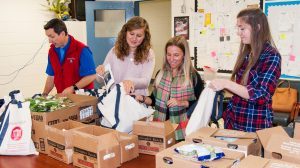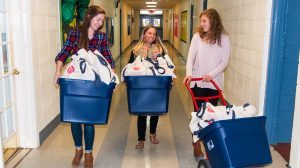Farm to YOUth Project Works to Transform Lives
Written by Bill Dabney for Ole Miss News
OXFORD, Miss. – Children at three Calhoun County elementary schools are trying kale for the first time.
Farm to YOUth, a six-week University of Mississippi pilot project supported by a $200,000 gift from global agriculture business Monsanto Co., also has the kids eating cucumbers, pineapple, sweet potatoes, Brussels sprouts and mango – all in an effort to improve health through nutritious eating.
“I would love to see them eat more green vegetables,” said Michelle Weber of Cincinnati, Ohio, a graduate student in nutrition who is working on the project. “I would just like to hear them say, ‘Wow, I tried this and it’s not terrible, so maybe I’ll take a little bit more.’”
Project director David H. Holben, a professor and chair of the UM Department of Nutrition and Hospitality Management, believes the project also will help prevent food insecurity, which is defined as a lack of access to nutritious food for an active, healthy life.
Food insecurity creates health risks for otherwise healthy individuals, hinders disease management and undermines quality of life.
According to a USDA report from 2014, 14 percent of U.S. households were food insecure, with households headed by women and those in rural areas being affected to an even greater degree. The same report indicates that Mississippi leads the nation in food insecurity.
“We came up with this idea to address this preventable health threat,” Holben said. “The Farm to YOUth program is an outreach and education program and we are measuring its efficacy.

David H. Holben (left) and members of his project team prepare bags of food to be delivered to students at Bruce Elementary School. Helping are (from left) Sydney Antolini, Michelle Weber and Kelsey Reece, all nutrition graduate students at Ole Miss. Photo by Bill Dabney
“We want to see if food insecurity is impacted in the short-run, if it will affect change in how kids are willing to try new vegetables and if it will decrease food waste in the cafeteria. In other words, do children eat more of their vegetables after participating in this program?”
Weber and two other nutrition graduate students – Sydney Antolini of Charlotte, North Carolina, and Kelsey Reece of Grenada – spend two days in the cafeterias of three different elementary schools each week, serving the children a raw fruit or vegetable on one day and then the same in a prepared state on the second day.
A subset of the children, those in one of the elementary schools, take ingredients home each Friday so their families can try the foods. The university also gave each of the 1,200 children a cookbook containing instructions for preparing and cooking the foods introduced by the project.
“What we’re trying to do is change the household food environment to make it more likely that the family members have adequate food and that they eat in a healthy manner,” Holben said.
“Food insecurity is directly related to Mississippi’s high rates of obesity. Even people who have only one or two symptoms of food insecurity are shown to have their weight affected. If we want to have an impact on obesity, we really have to make that impact early, before they’re teens.”
When Holben presented Farm to YOUth to Monsanto, the company jumped at the chance to support the work, establishing the Food and Nutrition Security Support Fund on behalf of the UM School of Applied Sciences.
“Through education and increased exposure to nutritious food, this program will have a positive impact on more than 1,000 households in Calhoun County, and we hope the program’s findings can be duplicated in other regions as well,” said Milton Stokes, director of global health and nutrition outreach for Monsanto.
“Because it also funds graduate students and helps them gain real-world knowledge and skills working with young people, we think the Farm to YOUth program will be a valuable experience as they take the front line in fighting food and nutrition insecurity.
“Personally, I’ve known Dr. Holben for many years and have closely followed his research on food insecurity and its impact on health. Considering the need for the program, and the talent of the faculty and graduate students at Ole Miss, this partnership makes a lot of sense.”

UM nutrition graduate students (from left) Kelsey Reece, Michelle Weber and Sydney Antolini deliver bags of vegetables to classrooms at Bruce Elementary School, where they will be distributed to children as part of the university’s six-week Farm to YOUth project. Photo by Bil Dabney
Velmer Burton, dean of the School of Applied Sciences, praised Holben’s work.
“This project is perfectly aligned with Chancellor Jeff Vitter’s vision to transform communities through outreach,” Burton said. “Dr. Holben and his students are changing lives for the better in Calhoun County. They are making that transformative impact on behalf of the university.”
Holben, a western Pennsylvania native who grew up in a household similar to the children of Calhoun County, said he’s grateful for the opportunity to help the community both physically and economically. He hopes to see the project replicated in other school districts.
“We have a really great relationship with Monsanto,” he said. “The students are all sending thank-you notes and cards expressing appreciation for their support. We are very thankful that they established the food and nutrition security fund specifically for the Farm to YOUth project. We couldn’t have done it without them.
“I’m also grateful to Dr. Teresa Carithers, our School of Applied Sciences associate dean, and to Katie Morrison in the Office of Development for their crucial involvement in getting this project off the ground. It really has been a group effort.”
The Food and Nutrition Security Support Fund established for the UM School of Applied Sciences is open to gifts from individuals and organizations. To contribute, send checks with the endowment name noted in the memo line to the University of Mississippi Foundation, 406 University Ave., University, MS 38655; visit http://www.umfoundation.com/makeagift or contact Katie Morrison, director of corporate and foundation relations at 662-915-2135 or katie@olemiss.edu.